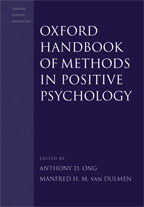New book explores research methods for studying hope, laughter, resilience, other aspects of positive psychology
By Susan S. Lang

Studying how hope, optimism, positive emotions, laughter, wisdom and resilience influence health, well-being, self-esteem, inspiration and motivation may seem like a ephemeral area of inquiry. But this is, in fact, a burgeoning field of science called positive psychology -- the psychology of human strengths.
To document the theory and provide a broad overview of the diverse methods used to conduct research in positive psychology, Anthony Ong, assistant professor of human development at Cornell, has co-edited "The Oxford Handbook of Methods in Positive Psychology" (Oxford University Press).
The handbook, composed of 42 chapters written by scholars in the field -- including two co-authored by Ong -- discusses the various approaches in detail, including specifics about such techniques as estimating variability and change at the level of the individual, identifying reliability of measurements within and across individuals and differentiating an individual's growth from phenomena that may exhibit short-term variability over time.
Written for scholars with no formal exposure to multivariate statistics and advanced measurement issues, the books takes a conceptual rather than mathematical approach, using many examples to show how innovative methods can be used for a wide variety of research problems in the field.
Ong, whose research focuses on the nature and development of resilience and positive adaptation across the life course, was recently named to the editorial board of The Journal of Positive Psychology. He has recently published several papers in the area of positive psychology, including studies on how positive emotions are related to resilience and stress in later life, hope as a source of resilience in later adulthood and the protective influence of social connectedness on everyday cardiovascular health.
"This is not a 'shelve-and-forget' book but rather an essential reference work that should be within easy reach of the fingertips of any positive psychologist serious about research," says Robert A. Emmons, professor of psychology, University of California-Davis, and editor-in-chief of The Journal of Positive Psychology. "This volume will serve as a catalyst to open new avenues of exploration and rigorous inquiry into aspects of the human condition that lead to happiness, fulfillment and flourishing."
Media Contact
Get Cornell news delivered right to your inbox.
Subscribe